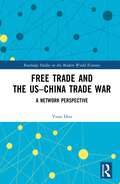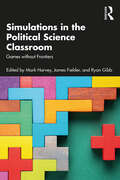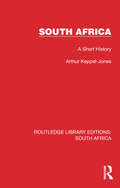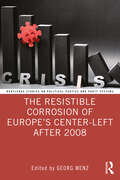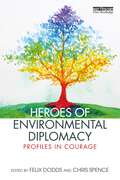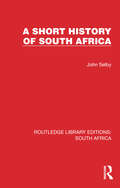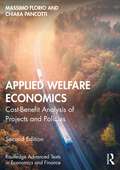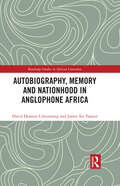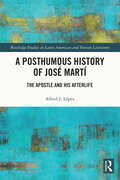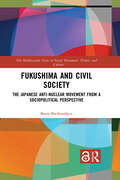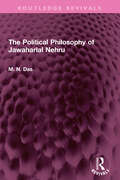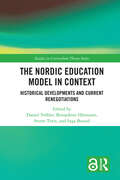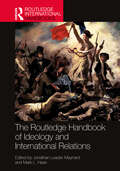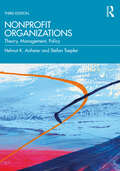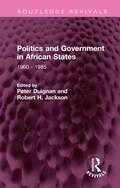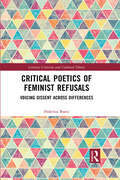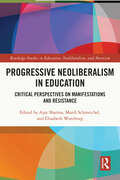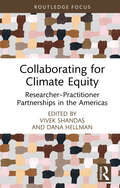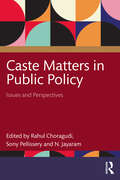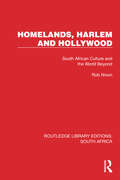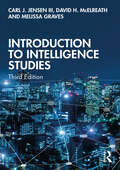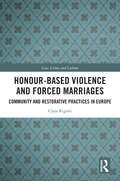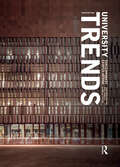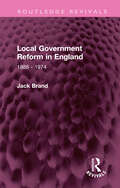- Table View
- List View
Free Trade and the US–China Trade War: A Network Perspective (Routledge Studies in the Modern World Economy)
by Yoon HeoThis book provides an analysis of the global trading system and its implications. The author uses network theory to examine the sustainability of the free trade system and its future. The book attempts to find out what the future of free trade could be and how the global trading system would unfold. The book assesses four main waves of challenges to free trade and open society: the COVID-19 pandemic, the US–China trade war, economic nationalism, and the Fourth Industrial Revolution. While some of these challenges have been casting their shadows on the global economic system for some time, others are relatively novel, and their full effects are yet to be seen. This book also looks at the challenges they would present to multilateralism and global trade development. This book will interest those who wish to have a better understanding of the US–China trade war and the challenges to the global trading system.
Simulations in the Political Science Classroom: Games without Frontiers
by Mark HarveyThis book is premised on the assumption that games and simulations provide welcome alternatives and supplements to traditional lectures and class discussions—especially in political science classrooms, where real-world circumstances provide ideal applications of theory and policy prescriptions. Implementing such an active learning program, however, is sometimes daunting to overburdened professors and teaching assistants. This book addresses the challenges of using games and simulations in the political science classroom, both online and in person. Each chapter offers a game or simulation that politics teachers can use to teach course concepts and explains ways to execute it effectively. In addition, the authors in this volume make a proactive case for games and simulations. Each chapter offers research to evaluate the effectiveness of the activity and pedagogical design best practices. Thus, the book not only serves as a game design resource, but also offers demonstrable support for using games and simulations in the political science classroom. Aimed at teachers at all levels, from high school through college, the book may be especially appealing to graduate students entering teaching for the first time and open to new teaching and learning approaches.
Simulations in the Political Science Classroom: Games without Frontiers
by Mark HarveyThis book is premised on the assumption that games and simulations provide welcome alternatives and supplements to traditional lectures and class discussions—especially in political science classrooms, where real-world circumstances provide ideal applications of theory and policy prescriptions. Implementing such an active learning program, however, is sometimes daunting to overburdened professors and teaching assistants. This book addresses the challenges of using games and simulations in the political science classroom, both online and in person. Each chapter offers a game or simulation that politics teachers can use to teach course concepts and explains ways to execute it effectively. In addition, the authors in this volume make a proactive case for games and simulations. Each chapter offers research to evaluate the effectiveness of the activity and pedagogical design best practices. Thus, the book not only serves as a game design resource, but also offers demonstrable support for using games and simulations in the political science classroom. Aimed at teachers at all levels, from high school through college, the book may be especially appealing to graduate students entering teaching for the first time and open to new teaching and learning approaches.
South Africa: A Short History (Routledge Library Editions: South Africa #11)
by Arthur Keppel-JonesOriginally published in 1949 but here reissuing the 5th edition of 1975 this is a vivid history of South Africa up to the mid 1970s. Tracing the development of Afrikaner nationalism and the conflict of black and white races in relation to economic, political and geographical factors, the author makes a clear and often critical analysis of the crisis in the first half of the 20th Century in the light of historical perspective.
The Resistible Corrosion of Europe’s Center-Left After 2008 (Routledge Studies on Political Parties and Party Systems)
by Georg MenzThis book examines and explains the Center-Left’s political decline since 2008, whilst analyzing the factors that account for its sagging electoral and popular support, losing voters both to the Far-Left, the Far-Right, and abstentions. Focusing on the era since the 2008 financial crisis in particular, while also charting the historical genealogy that led to the current impasse, the book examines how, when and why the collapse of Europe’s Center-Left occurred. Moving beyond existing and slightly dated accounts, the contributors explore why Social Democrats lack compelling answers to pressing current policy challenges. Faced with a decline in its core clientele, namely blue-collar workers, the Center-Left is being outflanked and risks permanently jeopardizing its erstwhile status as representing a catch-all party. Exploring one of the more pressing and timely political puzzles of the contemporary political scene in Europe, the book identifies six factors that have driven the decline of the Left and examines them systematically across eight countries: France, the United Kingdom, Germany, Sweden, Italy, Austria, the Netherlands, and Denmark. This book will be of particular interest to both scholars and students of social democracy, political parties, and the politics of the Left and more broadly to those interested in European and comparative politics, governance, and contemporary history.
Heroes of Environmental Diplomacy: Profiles in Courage
by Felix DoddsToday more than ever, when the world is beset by environmental, social, healthcare and economic challenges, we need courage in our politics, both nationally and globally. This book tells the stories, some for the first time, of twelve individuals who made heroic contributions to protecting our planet through ground-breaking international treaties. Can individuals change the world? Today, when impersonal forces and new technologies seem to be directing our lives and even our entire planet in ways we cannot control, this question feels more relevant than ever before. This book argues that we can all make a difference. It tells inspiring stories of individuals who have had a global impact that is beyond dispute, as well as others who have brought about change that is understated or hard to measure, where the scale of the impact will only become clear in years to come. While some are scientists, others are politicians, diplomats, activists, and even businesspeople. However, they all share the qualities of perseverance, patience, a willingness to innovate or try new approaches, and the endurance to continue over years, even decades, to pursue their goal. Drawing on interviews and the inside stories of those involved, each chapter follows one or more of these heroic individuals, a list which includes Luc Hoffmann, Mostafa Tolba, Maria Luiza Ribeiro Viotti, Raul Oyuela Estrada, Barack Obama and Paula Caballero. Presenting an uplifting and gripping narrative, this book is an invaluable resource for students, scholars, activists and professionals who are seeking to understand how consensus is reached in these global meetings and how individuals can have a genuine impact on preserving our planet and reinforcing the positive message that global cooperation can actually work.
A Short History of South Africa (Routledge Library Editions: South Africa #16)
by John SelbyOriginally published in 1973, this book begins with the arrival of the Europeans in South Africa. It examines the part played by the Dutch, British and Afrikaners, as well the diverse ethnic groups including the Xhosa and Zulus. The complicated period of the Difiqane or ‘Forced Migrations’ is clearly discussed as is the genesis and evolution of Apartheid. Other major events which are discussed include the advent of the 1820 Settlers, the Great Trek, the discovery of diamonds, the Jameson Raid, the occupation of land which became Zimbabwe, the Anglo-Boer Wars and the two World Wars. Accounts are given of Sharpeville and the subsequent introduction of legislation formalising separate development.
Applied Welfare Economics: Cost-Benefit Analysis of Projects and Policies (Routledge Advanced Texts in Economics and Finance)
by Massimo Florio Chiara PancottiApplied Welfare Economics: Cost-Benefit Analysis for Project and Policy Evaluation presents a consistent framework for applied welfare economics and is grounded in a comprehensive theory of cost-benefit analysis, specifically focused on offering a practical approach to policy and project evaluation. After opening with a theoretical discussion of the concept of social welfare, a critical analysis of the traditional doctrine of welfare economics embodied in the Two Fundamental Theorems, and a presentation of social cost-benefit analysis, the book introduces readers to an applied framework. This includes the empirical estimation of shadow prices of goods, the social cost of labour and capital, and the assessment of risk. The book also examines real-life experiences with cost-benefit analysis, including ex-post evaluation of major projects, economic rates of return in different sectors, and a case study on privatisation. These chapters draw on first-hand research gained by the author team from years of advisory work for the European Commission and other international and national institutions. This second edition presents updated data, more international examples, and more coverage of topics such as very long run discounting effects and climate change as an intergenerational effect. It also includes more practical examples and end-of-chapter questions to aid student’s learning. Applied Welfare Economics is a valuable textbook for upper-level courses on welfare economics, cost-benefit analysis, public policy analysis and related areas.
Autobiography, Memory and Nationhood in Anglophone Africa (Routledge Studies in African Literature)
by David Ekanem Udoinwang James Tar TsaaiorThis book provides an important critical analysis of the autobiographies of nine major leaders of national liberation movements in Africa. By examining their self-narratives, we can better understand how decolonisation unfolded and how activist-politicians sought to immortalise their roles for posterity. Focusing on the autobiographies of Peter Abrahams, Albert Luthuli, Ruth First and Nelson Mandela (South Africa), Nnamdi Azikiwe (Nigeria), Kenneth Kaunda (Zambia), George Mwase (Malawi), Kwame Nkrumah (Ghana), Maurice Nyagumbo (Zimbabwe), and Oginga Odinga (Kenya), the book uncovers the social and cultural forces which galvanized the anti-colonial resistance movement in African societies. In particular, the book explores the disdain for foreign domination, economic exploitation and cultural imperialism. It delves into themes of African cultural sovereignty before the colonial encounter, the disruptive presence of colonialism, the nationalist ferment against European imperial domination, the achievement of political autonomy by African nation-states and the corpus of contradictions which attended postcolonial becoming. With important insights on how these key historical figures navigated the process of self-determining nationhood in Africa, this book will be of interest to researchers of African literature, history, and politics.
A Posthumous History of José Martí: The Apostle and his Afterlife (Routledge Studies in Latin American and Iberian Literature)
by Alfred J. LópezA Posthumous History of José Martí: The Apostle and His Afterlife focuses on Martí’s posthumous legacy and his lasting influence on succeeding generations of Cubans on the island and abroad. Over 120 years after his death on a Cuban battlefield in 1895, Martí studies have long been the contested property of opposing sides in an ongoing ideological battle. Both the Cuban nation-state, which claims Martí as a crucial inspiration for its Marxist revolutionary government, and diasporic communities in the US who honor Martí as a figure of hope for the Cuban nation-in-exile, insist on the centrality of his words and image for their respective visions of Cuban nationhood. The book also explores more recent scholarship that has reassessed Martí’s literary, cultural, and ideological value, allowing us to read him beyond the Havana-Miami axis toward engagement with a broader historical and geographical tableau. Martí has thus begun to outgrow his mutually-reinforcing cults in Cuba and the diaspora, to assume his true significance as a hemispheric and global writer and thinker.
Fukushima and Civil Society: The Japanese Anti-Nuclear Movement from a Socio-Political Perspective (The Mobilization Series on Social Movements, Protest, and Culture)
by Beata BochorodyczThis book analyzes the impact of the Fukushima disaster on civil society in Japan with particular attention to the anti-nuclear movement, focusing on its development, repertoire of action, mobilization strategies, modes of operation, and impact on the state’s energy policy. Combining social movement theory and civil society theory, the author draws on extensive fieldwork in Japan to explore the context of the sociopolitical situation in Japan up to the Fukushima accident and to offer a typological description and analysis of the anti-nuclear movement that emerged after the disaster. Through an analysis of the relationship between the power elite and the anti-nuclear movement organizations, this volume considers the influences exercised by the ruling elites on civil society and vice versa, thus assessing the effects of the anti-nuclear movement on the state policy and the society. A comprehensive account of the anti-nuclear movement in post-Fukushima Japan, embedded within a broader perspective of the movement’s historical development, contemporary political structures, and opportunities, Fukushima and Civil Society will appeal to scholars of sociology and politics with an interest in social movements. Chapter 4 of this book is freely available as a downloadable Open Access PDF at http://www.taylorfrancis.com under a Creative Commons [Attribution-Non Commercial-No Derivatives (CC-BY-NC-ND)] 4.0 license.
The Political Philosophy of Jawaharlal Nehru (Routledge Revivals)
by M.N. DasFirst published in 1961, The Political Philosophy of Jawaharlal Nehru is an attempt to coordinate Jawaharlal Nehru’s ideas which, in essence, reflect his political philosophy. Nehru distinguished himself as a philosopher-politician, thinking somewhat as a philosopher while working as a politician, steering his political ideas between idealism and realism. In an eventful life, his had been the many-sided role of a revolutionary and a nationalist, a democrat and a socialist, an internationalist and a pacifist, a head of the government and, above all, a lone individual and thinker. Nehru preserved his individuality through all external influences, including those of Gandhi and Marx, and it is this which remains the keynote of his thought. It has been the aim of the author to present in an objective way the ideas of the man in the light of his own words as available from a wide range of material. This book will be of interest to students of history, political science, and philosophy.
The Nordic Education Model in Context: Historical Developments and Current Renegotiations (Studies in Curriculum Theory Series)
by Daniel Tröhler Bernadette Hörmann Sverre Tveit Inga BostadTracing historical and cultural factors which gave rise to the Nordic Education Model, this volume explores why Northern European education policy has become an international benchmark for schooling. The text explains the historical connection between a Nordic ideal of democracy and schooling, and indicates how values of equality, welfare, justice, and individualism might be successfully integrated in national school systems and curricula around the world. The volume also highlights recent debates around the longevity of the Nordic model and explores the risks and challenges posed by international policy and assessment agendas. Exploring how Nordic education polices successfully merge social equity with academic excellence, the book combines cultural, historical, sociological and philosophical analysis with a deep exploration of curriculum and teaching. This book will be of great interest to researchers, scholars, and postgraduates working across the fields of curriculum, comparative education, cultural studies and history and philosophy of education and education policy.
The Routledge Handbook of Ideology and International Relations (Routledge International Handbooks)
by Jonathan Leader MaynardThe Routledge Handbook of Ideology and International Relations reviews, consolidates, and advances the study of ideology in international politics. The volume unifies fragmented scholarship on ideology’s impact on international relations into a wide-ranging and go-to volume. Declarations of the ‘end of ideology’ have once again been proven premature: nationalisms of various stripes are thriving; ideological polarization and conflicts both within and among states are growing; and environmentalist, feminist and anti-globalization activists are intensifying their demands on international institutions and states. This timely volume presents ideology as a way of explaining these major developments of world politics, rejecting the simplistic association of ideology with passionate convictions in favor of more complex theories of ideology’s influence. The chapters summarize cutting edge knowledge on major topics, suggest key implications for broader theoretical debates and frameworks, and point the way forwards to future avenues of inquiry. Contributors adopt puzzle-orientated causal, constitutive and/or critical approaches with a central focus on the determinants and effects of ideological phenomena and their interaction with other aspects of politics. This handbook is of key interest to students and scholars of ideologies, international relations, foreign policy analysis, political science, political theory and more broadly to sociology, psychology, and history. The Routledge Handbook of Ideology and International Relations is part of the mini-series Europe in the World Handbooks examining EU-regional relations.
Nonprofit Organizations: Theory, Management, Policy
by Helmut K. Anheier Stefan ToeplerIn this new edition of the popular textbook, Nonprofit Organizations: Theory, Management, Policy, Helmut K. Anheier and Stefan Toepler have fully updated, revised, and expanded this comprehensive introduction to a growing field. The text takes on an international and comparative perspective, detailing the background and concepts and examining relevant theories and central issues. Anheier and Toepler cover the full range of nonprofit organizations—service providers, membership organizations, foundations, community groups—in different fields, such as arts and culture, health and social services, and education. Introducing central terms such as philanthropy, charity, social entrepreneurship, social investment, and civil society, they explain how the field relates to public management and administration. This textbook is systematic in its approach to theories, management, and policy. The first edition won the Best Book Award at the American Academy of Management in 2006, and this new edition will continue to match the growing demand for academic teaching. Nonprofit Organizations: Theory, Management, Policy is an ideal resource for students of both undergraduate and postgraduate courses.
Politics and Government in African States: 1960 - 1985 (Routledge Revivals)
by Peter Duignan Robert H. JacksonOriginally published in 1986, Politics and Government in African States 1960-1985 deals with the politics of sub-Saharan African states since independence. Each chapter considers the formal structure of government at the time of independence and traces the subsequent changes. Each chapter also describes the development of the state machinery, the civil service, the parastatals, defence and police forces, party structure, the political opposition and trade unions. The economics of African states are dealt with insofar as they affect politics and government.
Critical Poetics of Feminist Refusals: Voicing Dissent Across Differences (Literary Criticism and Cultural Theory)
by Federica BuetiCritical Poetics of Feminist Refusals renders a vivid portrait of the intergenerational and intersectional dialogue between influential feminist writers on how to say no to the conditions of oppression, exclusion, and exploitation imposed by patriarchal and systemically racist capitalist societies. The book provides today’s readers and writers access to the powerful inventory of concepts and techniques that two generations of feminists have assembled for refusing domination and constituting fugitive forms of sociability and writing. Drawing on examples from feminist thinkers, Audre Lorde, Carla Lonzi, Hélène Cixous, Hortense Spillers, Alexis Pauline Gumbs, Anne Boyer and Simone White, the book focuses on how the power dynamics of recognition tie the uses of language to the material conditions of discrimination in everyday life.
Progressive Neoliberalism in Education: Critical Perspectives on Manifestations and Resistance (Routledge Studies in Education, Neoliberalism, and Marxism)
by Ajay SharmaThis volume makes the novel contribution of applying Nancy Fraser’s concept of progressive neoliberalism to education in order to illustrate how social justice efforts have been co-opted by neoliberal forces. As well as recognising the lack of consensus surrounding the very nature of Fraser’s concept of progressive neoliberalism, the book delivers a diversity of perspectives and methodological orientations that offer critical and nuanced examination of the diverse ways in which progressive neoliberalism has shaped education in North America. Documenting manifestations of progressive neoliberalism in areas including anti-racist education, teacher education, STEM, and assessment, the volume uses qualitative empirical research and critical discourse analysis to identify emerging tools and strategies to disentangle the progressive aims of education from neoliberal agendas. Offering a rarely nuanced treatment of the phenomenon of neoliberalism, this text will benefit scholars, academics, and students in the fields of education policy and politics, the sociology of education, and the philosophy of education more broadly. Those involved with the theory of education and multicultural education in general will also benefit from this volume.
Collaborating for Climate Equity: Researcher–Practitioner Partnerships in the Americas (Routledge Focus on Environment and Sustainability)
by Vivek Shandas Dana HellmanThis book explores the capacity of different stakeholders to work together and build urban resilience to climate change through an equity-centered approach to cross-sectoral collaboration. Urban areas, where the majority of the global population dwells, are particularly vulnerable to a myriad of climate stressors, the effects of which are acutely present in places and to communities that have been largely excluded from decision-making processes. Our need for working and learning together is at a critical threshold, yet at present, the process for and understanding of inter-sectoral collaborations remains a theoretical ideal and falls short of the broad appeal that many have claimed. Collaborating for Climate Equity argues that researcher–practitioner partnerships offer a promising pathway toward ensuring equitable outcomes while building climate resilience. By presenting five case studies from the United States, Chile, and Mexico, each chapter explores the contours of developing robust researcher–practitioner collaborations that endure and span institutional boundaries. The case studies included in the book are augmented by a synthesis that reflects upon the key findings and offers generalizable principles for applying similar approaches to other cities across the globe. This work contributes to a nascent knowledge base on the real-world challenges and opportunities associated with researcher–practitioner partnerships. It provides guidance to academics and practitioners involved in collaborative research, planning, and policymaking.
Caste Matters in Public Policy: Issues and Perspectives
by Rahul Choragudi Sony Pellissery N. JayaramCaste in India, despite its historical resilience, has been undergoing transformation since independence. If caste as a system of rigid stratification has been on the decline, castes as autonomous interest-serving groups have been on ascendance. This book critically engages with the changing notions of caste and its intersection with public policy in India. It discusses key issues such as social security, internal reservation, the idea of Most Backward Classes, caste issues among non-Hindu religious communities, caste in census, caste in market, and service castes and urban planning. Drawing on in-depth case studies from states including Andhra Pradesh, Delhi, Karnataka, Punjab, Tamil Nadu, Telangana, and West Bengal, the volume explores the cyclical process of how caste drives policies, and how policies in turn shape the reality of caste in India. It looks at the impact of factors like protective discrimination, adult franchise and democratic decentralization, horizontal and vertical mobilisation, land reforms, and religious conversion on social mobility, and traditional hierarchy in India. Empirically rich and analytically rigorous, this book will be an excellent reference for scholars and researchers of public policy, public administration, sociology, exclusion studies, social work, law, history, economics, political science, development studies, social anthropology, and political sociology. It will also be of interest to public policy and development practitioners.
Homelands, Harlem and Hollywood: South African Culture and the World Beyond (Routledge Library Editions: South Africa #15)
by Rob NixonOriginally published in 1994, Homelands, Harlem & Hollywood examines the anti-colonialist struggle against apartheid, and the ways in which American and South African culture have been fascinated with and influenced by one another. Rob Nixon’s wide-ranging analysis looks at Hollywood representations of the struggle for liberation, the impact of the Harlem Renaissance on the Sophiatown writers, the banning and censorship of television under apartheid, Mandela and messianic politics, the sports and cultural boycotts, ethnic nationalism, and the culture of violence. Nixon concludes with an investigation of how the collapse of communism and anti-communism and the rise of ethnic cleansing in Eastern Europe and the former Soviet Union had powerful implications for the shape of post-apartheid South Africa.
Introduction to Intelligence Studies
by Carl J. Jensen, III David H. McElreath Melissa GravesIntroduction to Intelligence Studies (third edition) provides an overview of the US intelligence community, to include its history, organization, and function. Since the attacks of 9/11, the United States Intelligence Community (IC) has undergone an extensive overhaul. This textbook provides a comprehensive overview of intelligence and security issues, defining critical terms and reviewing the history of intelligence as practiced in the United States. Designed in a practical sequence, the book begins with the basics of intelligence, progresses through its history, describes best practices, and explores the way the intelligence community looks and operates today. The authors examine the "pillars" of the American intelligence system—collection, analysis, counterintelligence, and covert operations—and demonstrate how these work together to provide "decision advantage." The book offers equal treatment to the functions of the intelligence world—balancing coverage on intelligence collection, counterintelligence, information management, critical thinking, and decision-making. It also covers such vital issues as laws and ethics, writing and briefing for the intelligence community, and the emerging threats and challenges that intelligence professionals will face in the future. This revised and updated third edition addresses issues such as the growing influence of Russia and China, the recent history of the Trump and Biden administrations and the IC, and the growing importance of the cyber world in the intelligence enterprise. This book will be essential reading for students of intelligence studies, US national security, foreign policy and International Relations in general.
Honour-Based Violence and Forced Marriages: Community and Restorative Practices in Europe (Law, Crime and Culture)
by Clara RigoniIn the last 20 years, the related phenomena of honour-based violence and forced marriages have received increasing attention at the international and European level. Punitive responses towards this type of violence have been adopted, including ad hoc criminalisation and legislation containing direct references to the concepts of honour, culture, and tradition. However, criminal law-based responses present several shortcomings and have often disregarded the specific needs that victims of such crimes might encounter. This book examines the possibility of using alternative programmes to address cases of honour-based violence and forced marriages. After reviewing previous existing literature, it presents new empirical data. Introducing a case study from the United Kingdom, the book recalls the debate on Sharia Councils and the Muslim Arbitration Tribunal, but examines instead other community-based secular programmes. By comparison, a study from Norway on the work of the National Mediation Agency and the so-called Cross-Cultural Transformative Mediation model is investigated as part of a larger multi-agency approach. Ultimately, in an attempt to reconcile pluralism and the rule of law, the book proposes effective ways to tackle honour crimes based on cooperation and individualisation of the proceedings, and capable of improving women’s access to justice and reducing secondary victimisation. The book will be essential reading for researchers and academics in Law, Criminology, Sociology, and Anthropology and for policy-makers and practitioners working with honour-based violence cases.
University Trends: Contemporary Campus Design
by Jonathan Coulson Paul Roberts Isabelle TaylorThe campus has a deep-rooted prestige as a place of teaching, learning and nurturing. Conjuring images of cloistered quadrangles, of sunny lawns, of wood-panelled libraries, it is a word viscerally charged with centuries of scholarly tradition. And yet it is also a place of cutting-edge science, vibrancy and energy. It is this dual nature, this concurrent adherence to tradition and innovation, which renders the physical environment of the university such a redolent, enduring and dynamic realm. However, it also means that the twenty-first-century campus is a highly challenging and exacting landscape to design and manage successfully. Today, the scale of the pressures and the rate of change facing higher education institutions are greater than ever. Squeezed public spending, growing societal expectations and the broadening education ambitions of developing nations are set against a backdrop of rapid technological progress and changing pedagogies. What are the repercussions for the physical realities of university planning and architecture? And how are university campuses adapting to contend with these pressures? University Trends: Contemporary Campus Design introduces the most significant, widespread, and thought-provoking trends that are currently shaping the planning and architecture of higher education institutions across the world. Within this completely revised third edition, Part One identifies current patterns such as student hubs, large-scale expansions and buildings for innovation and interdisciplinary research. Part Two profiles these through recent, well-illustrated, global case studies. This is the essential guide to current and future trends in campus design.
Local Government Reform in England: 1888 - 1974 (Routledge Revivals)
by Jack BrandOriginally published in 1974, this study concerns the politics of local government reform between 1942-1974 and describes the struggles between the Ministries, the Local Government Associations and political parties. The political manoeuvrings of the various groups involved are analysed and a theory proposed about the reform of political structures in general.
